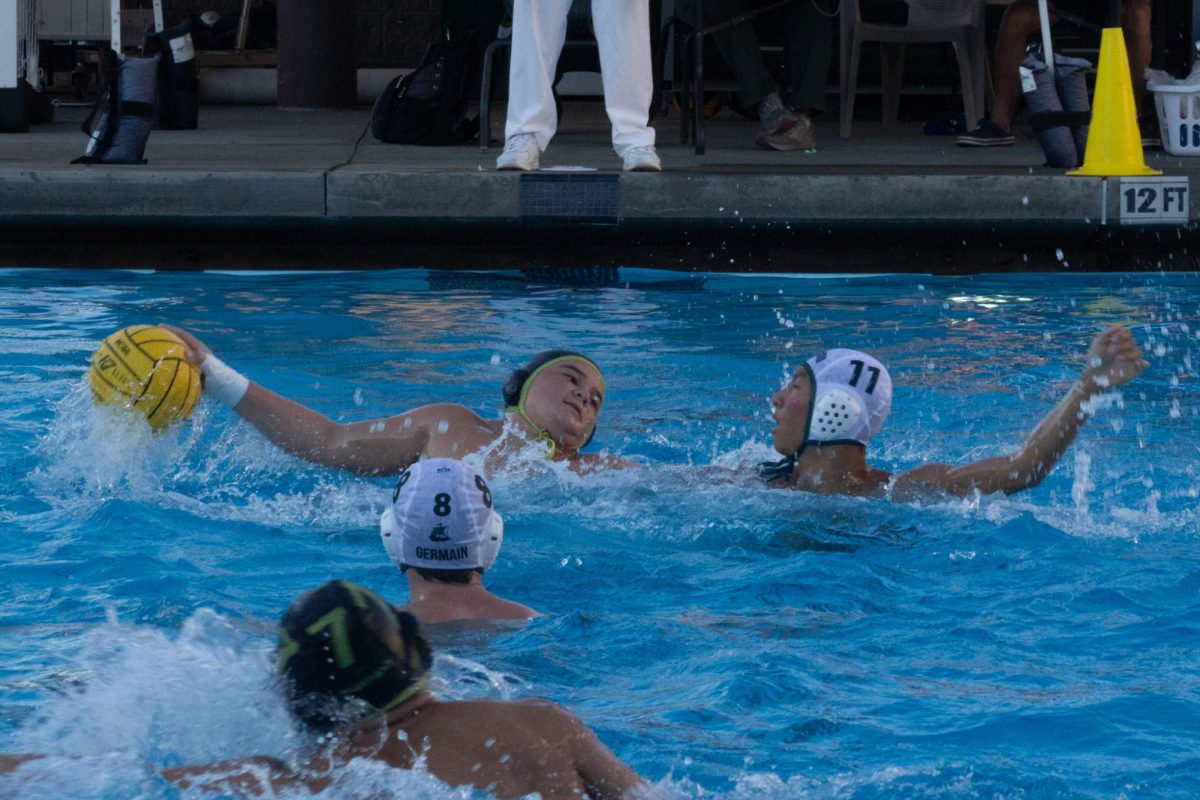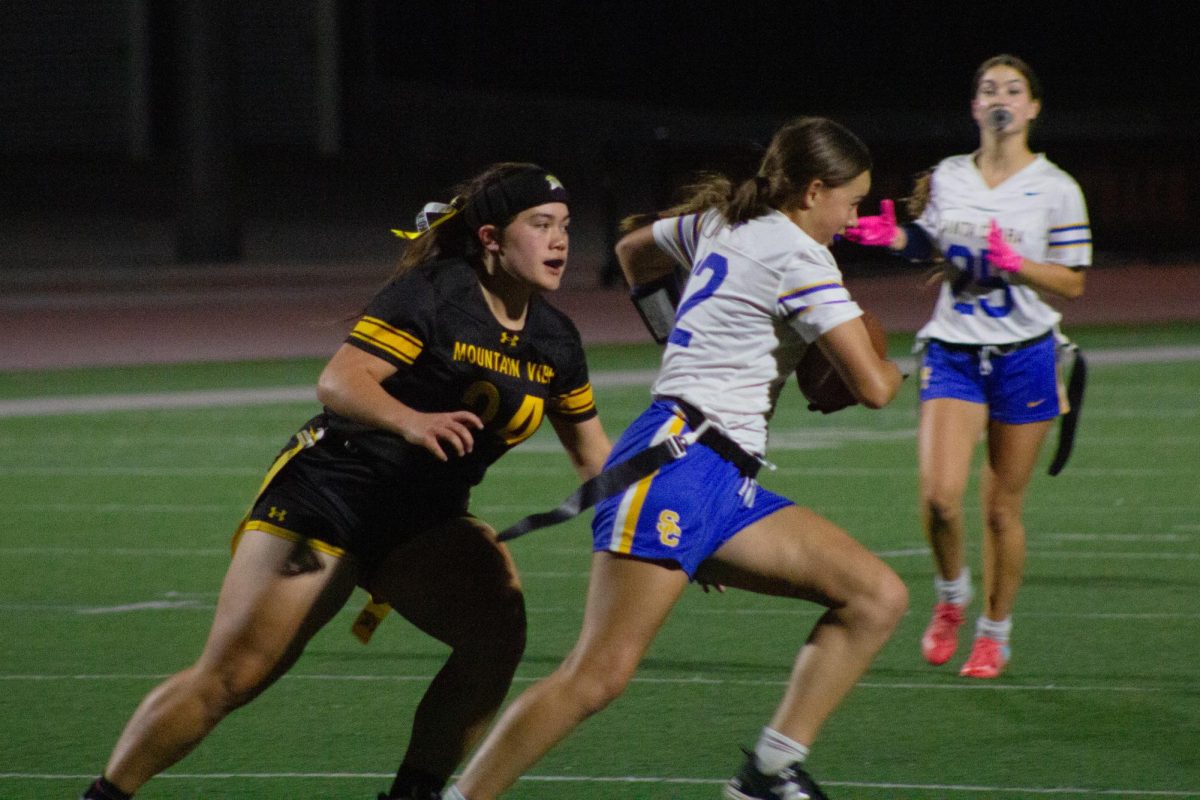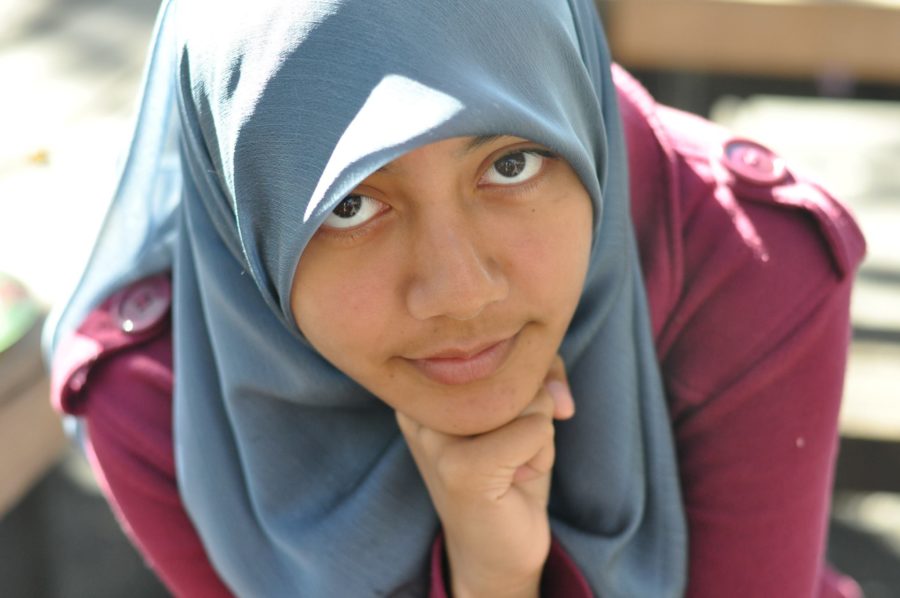An Oracle writer sat down with Ziana Deen, senior, to ask her about her identity and experiences as a follower of Islam. Part of religion that is often negatively stereotyped, Deen has grown up in a world drastically different from that of most students her age. Deen addresses Islamophobia and what it’s like to be Muslim in present-day America, as covered in the December issue of the Oracle.
Oracle: What religion do you identify with?
Deen: The religion I identify with is Islam. Islam, in its direct translation, means submission to God. A Muslim, then, is one who submits. I always thought it was because God has given us free will to do what we want to do, and we have the choice to submit to him or not, to worship him or not, to believe in him or not. I made the choice to believe in God. Muslims submit to ‘the words of God’ (the holy book, Qu’ran) and follow ‘the words and actions of our Prophet Muhammad (the Sunnah). While these are the main guidelines of our faith, there are numerous other guidelines that matter,such as basic Islamic etiquette (how we behave and interact with people) and Islamic history and laws.
O: How religious would you consider yourself?
Deen: As Muslims go, I’m pretty religious in that I follow the Quran and Sunnah, and follow the five pillars of Islam (belief in God and our Prophet, praying the five prayers, giving money to the needy, fasting during the holy month of Ramadhan,and performing the religious pilgrimage to Hajj) . Most people will look at me wearing my hijab (head scarf) and think I am religious because I wear it. While I do wear it by choice to honor God, what defines me as religious is how I behave and act. I do my best to uphold my religious beliefs, such as reading the Quran, adhering to food restrictions (no pork, non-halal meat (halal means things that are religiously permissible; in the case of halal meat, the animal must have been treated well while it was living, killed quickly and painlessly, and be blessed upon) or alcohol), fasting during the holy month of Ramadan, being kind and considerate to others, and praying the 5 prayers on time. I’ve also done the religious pilgrimage, Hajj, when I was ten and hope to do it once more in my life.
O: Can you tell me about your experience being Muslim in America in general?
Deen: I was three when 9/11 happened, which set the precedent of what it meant to be a Muslim American for my childhood. I’ve learned that people are wary about those who look different or live differently. Since I went to a private Islamic school from kindergarten to eighth grade, I wasn’t treated differently in school. But in 8th grade, when I started covering my hair, I felt the difference in attitude from outside my school. Some people – cashiers, public librarians, random strangers – would treat me coldly or more abrupt than socially acceptable.
Due to the media, people have negative prejudices about Muslims that they might not even be aware of, and tend to act on these prejudices. Last April, a woman approached me and my sister and suggested wearing the hijab was a form of oppression that went against all the work people have done for women’s rights. This past October, my sister and I were walking on the sidewalk when a guy drove past us, screamed “Je Suis Charlie!” before driving off, implying we were terrorists.
I was raised knowing that when I started wearing the hijab, I would be a visual representation of my religion. What I do and say would influence the way people saw Islam so I learned to be careful and aware of my surroundings. So when the woman came up to us in the store, instead of acting on the anger and disbelief we felt, my sister and I were polite and cordial, telling her clearly and calmly that wearing the hijab was our choice. We knew that if we had blown up on this woman, who simply didn’t know any better, her image of Islam would be that of two angry girls who responded bitterly to an ignorant comment. Her perception of Muslims would no doubt have worsened. Some people just don’t know better and I know that if I want to do anything to improve the image of Islam and Muslims, I can’t act on the humiliation and anger I feel when faced with ignorance and rudeness.
But my unfortunate encounters with these people does not mean others aren’t good to me. Many people have treated me respectfully, just as they would any other 17-year old girl.
O: What about in our school’s community specifically?
Deen: The first week of freshman year was hard. It was my first time in a public school and I was surrounded by strangers (nobody from my private school came to MVHS) who knew nothing of my religion. Like I said before, most people are wary about things they don’t know about and in freshmen year, most people were initially hesitant to interact with me. I had to instigate conversations and throw myself out there so people knew I wasn’t someone to be wary of and that’s how people began warming up to me.
Since then, most MVHS students have been pretty nice. While most simply don’t know much about Islam, many are religiously sensitive and considerate. One friend has even offered to bring halal meat for a potluck, which I was greatly touched by. Selected others have not been so kind. Some of my classmates, and even my friends, think it’s funny to make terrorist jokes around me, or make inappropriate implications about me being a terrorist. One person even attempted to pull off my head covering (in this case, a beanie) as a joke. Even some of my teachers have treated me differently, and made slight comments about all Muslims being radical or extremists.
Some people have even questioned my American citizenship, not believing me when I say I’m a born and raised American citizen. And despite my American accent, people still assume I’m foreign born and are convinced English is not my first language (it is my first language and the only language I can speak fluently) Others have questioned my beliefs to my face, attempting to correct me on my understanding of Islam, as if they were the ones who learned and practiced Islam for the past seventeen years. I’ve learned that most people are just ignorant about Islam, and are trying to understand it through jokes in a way to relate to me. I can understand it, but that doesn’t make it excusable. It doesn’t makes me feel safe or accepted.
O: How does all of this make you feel personally? How does it make your community feel?
Deen: It makes me feel hurt and disappointed. It’s not exactly a great feeling to be constantly bombarded by people who are ignorant about your faith, and what little they do know has been negatively influenced by a biased media. What gives people the right to call me a terrorist? I feel humiliated when absolute strangers come up to me, thinking they have an obligation to save me. I don’t need anyone to save me from my faith. I don’t question their beliefs or choice in clothes, so why do they do it to me?
Among the most frustrating things I’ve heard are: ‘why aren’t Muslim communities condemning the actions’, or, ‘why are girls the only ones who cover?’ The problem is that people aren’t paying attention to the communities that are helping, and are not listening to the Muslims who have constantly, and repeatedly, condemned such actions for decades. People think that just because I cover, I’m being oppressed. Do they know that Muslim women are the main activists for women and civil rights? That there are so many Muslim women who are achieving successes in their careers, and who are supported and loved by their families and communities? Nobody sees this, because the media never shows it.
O: Has any of this ever made you feel isolated from your society?
Deen: Well yes, I have felt isolated at times, both in school and outside. Due to my religious beliefs, I haven’t experienced many typical American experiences: eating twinkies, having sleepovers, trick o’treating, celebrating Christmas, etc. I don’t have a problem with this because I have my own things to look forward to each year, two celebratory events called Eid that are full of good food, old friends, and presents; Ramadan, when I can see my childhood friends and have feasts every night; and various other cultural (not religious) events. The thing is, with my unique background, heritage, and religion, not many others have experienced my lifestyle and therefore, cannot understand various aspects of my life. Lack of common experiences has made me feel distant from others at times. Additionally, I have always been socially conscious of myself, always aware that I was different than others. When I was younger, it was because I wasn’t white. Now, it’s because I wear a cloth around my head. No matter where I am, I’m set off from others simply because of the way I look. I have no regrets about this choice but I do wish people didn’t treat me differently because of my beliefs and the way I dress.
O: What is the most common misconception you would address?
Deen: Unfortunately, I can’t settle to correct only one misconception because there are so many. To begin with, as a practicing Muslim who has been raised on Islamic values, I would like to state that Islam does NOT promote violence. Islam upholds the belief that taking one human life is as though you are killing all of humanity. Self-defense when facing violence is allowed, but acting on extreme, violent ideas on innocent people in the name of Islam is haram (religiously forbidden). My religion is not a violent one and it is painful and heartbreaking to hear it equated to by people who aren’t actually practicing the beliefs. If a person is violent, the way they approach their religion will be violent.
Also, Islam does not oppress women. One main issue everyone seems to have with Islam is that it forces women to be submissive to men, to cover their bodies as though it is something to be ashamed by, and to basically be neither seen nor heard. That is absolutely ridiculous. In Islam, men and women are equal in the eyes of God. The problem is, in the eyes of humanity, they are not. There are numerous cultures, including here in America, where women are placed on a lower standing. Women are, in general, considered inferior to men globally, which is something that makes me angry as it is not something in my belief. But this distinction isn’t a religious thing. Because some of these cultures are in a place where Islam is prominent, people tend to mix culture and religion and thus, others assume Islam declares disparity between men and women; this is incorrect because it is the culture of the community that dictates how people will actually behave and what they believe.
Also, not all Muslims are Arab. The majority of Muslims actually live in Indonesia. For example, some people have assumed right away that I am Arab and when I say I’m Asian, telling me “the Middle East isn’t really Asia”. I’m half-Malaysian and half-Sri Lankan. I consider myself Asian. And one shouldn’t assume all Muslims speak Arabic. Some do because the Qu’ran (the holy book) is written in Arabic and they learn Arabic to read the scripture. I know Arabic proficiently because I took ten years of it at my private school – if I hadn’t known Arabic by now, that would really be embarrassing. And lastly, just because I am a religious individual does not mean I’m not a teenage girl. I watch television, I read books, I like movies and going crazy over celebrities every now and then. I’m not interested in converting others either. Just because I am obviously religious does not mean I am conservative or have backwards ideologies.
O: Can you think of any solutions for this issue?
Deen: People are influenced by the media and tend to assume things about Muslims. Coupled with their ignorance, their assumptions often lead to awkward encounters where I am insulted. I would recommend people simply ask me questions before they assume I’m oppressed or Arab. If they’re too embarrassed or too shy to do so and are curious, I recommend researching about Islam themselves rather than believing what they hear in the media. The media uses sensationalism to get higher ratings and thus, exaggerate and portrays Muslims in a negative light. This tendency should be criticized. Also, don’t make terrorist jokes or imply I’m a terrorist. They are not funny. I will never find them funny. People like to disguise prejudice within jokes and when I call them out on it, claim I can’t take a joke. I can take a joke. But what they’re doing is not joking. It’s rude and offensive, and a poor attempt at trying to include me in conversation.
O: What do you hope to see in the future regarding stigma and acceptance?
Deen: I hope that in the future, people take a grain of salt when watching the news of reading things online because everything has a bias. I hope that people would verify information before accepting everything on a blind faith.

































find new domain • Jan 21, 2016 at 7:37 am
Kudos to Ziana and Sanskriti for sharing Ziana’s articulate and important insights–and a perspective casting light where there is plenty of heat…a perspective certainly deserving of a wider audience. Thank you both for the courage it takes to share this perspective, and for the excellent reporting!
find new domain • Jan 20, 2016 at 4:46 pm
Thank you! This is a spectacular article which would be equally useful in the Mountain View Voice or the Mercury.
I’d love more articles like this — thoughtful interviews of students who can express themselves articulately about civil rights.